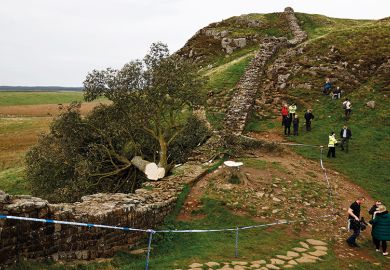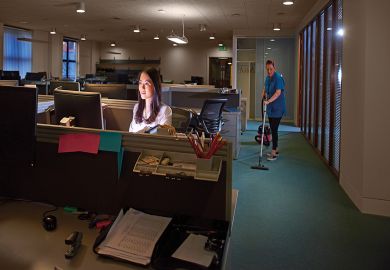People assume that when I and others of my generation finished our PhDs there were jobs galore. Not so. I went to the University of Hull but the smell of fishmeal was more than I could take. Otherwise, I had a choice between Aberystwyth University and a religiously oriented institution in Western Canada, where I suspected they sacrificed the firstborn. I hesitated but finally took the train to Aberystwyth.
It was raining when I arrived, not vertically but horizontally, driven by the onshore wind, remnant of a hurricane that had already ravaged the US East Coast. I ducked into a bookshop and bought the town guide – copyrighted, I noticed, 50 years earlier. It boasted of the complete absence of malarial fog – something that I am happy to confirm – and the pleasure of breathing in the invigorating ozone created by waves crashing on to the beach (ozone being a respiratory hazard that destroys mucus).
I bought a local newspaper. The headline read: “Yoghurt Farmer Fined for Dung-Splashed Walls”. Several pages on there were advertisements for stillborn lambs. It occurred to me that under certain circumstances the killing of the firstborn might be preferable.
I watched as the end of the pier fell off and began to plan my retreat, even as I had to concede that here was a town that evidenced proper respect for the second law of thermodynamics
I went into the interview determined to refuse any job that might be offered but had heard that if you did they would not pay travel expenses. I thus had to fail. The interview was held, as I recall, in the building in which Henry V had kept prisoners from Agincourt, though perhaps that was the castle blown up by the Parliamentarians in 1649.
Aberystwyth, as I would subsequently learn, has previous for things being pulled down, burned, abandoned.
A woman in a thick cardigan from a department I never identified asked if I played sport, nodding encouragingly. Then I was asked how I liked Aberystwyth. Since the gale was still blowing outside and the ozone was fast accumulating, I hazarded “not much”, assuming that would do the trick, and indeed it did. Unfortunately, six months went by and I was still without a job. Aberystwyth readvertised. I reapplied and was asked if I played sport and how I liked the town.
“Very much,” I replied, and was appointed.
There is much to be said for Aberystwyth, especially if you did your undergraduate degree at the University of Sheffield before smokeless zones were created. Sheffield is said to be built on seven hills, which has led the deluded to compare it to Rome. While I was there I never saw the hills, obscured as they were by a grey smog lit only in the direction of Rotherham by an occasional opening of the gates of hell as blast furnaces did their bit in the creation of knives and forks. At least you could breathe in Aber (the ozone having been mistaken for rotting seaweed), even if in those days it was a little light on entertainment (although things have changed, I feel obliged to make clear). The only cinema was heated by gas fires fixed high on the walls and turned on and off via the application of a long pole, usually in the intervals while they mended the film. Nor did this seem the Welsh equivalent of Harvard University: the manager of the institution’s bookshop took me aside one day to ask whether Adam Bede was by George Eliot or George Eliot by Adam Bede.
Of course, if you fancied a taste of racy urban high life you could always take the single-track railway and in a matter of hours reach the fleshpots of Shrewsbury, but that involved crossing a national border and if you did that travel expenses were halved.
The Welsh nationalists did their best to make one feel at home, spraying out the road signs including (and I thought this a touch unfair) the one indicating the direction to the hospital. Particularly interesting television programmes suddenly disappeared to be replaced by Welsh-language programmes at that time produced by a resentful BBC.
On the bright side, I would walk to work around Cardigan Bay, which would be the envy of any commuter – except when it rained. Then I would arrive soaked, remove my trousers and put them over the convector heater in the hope that students would not wish to see me and if they did would not press charges. In the winter, spray from the waves often completely enveloped the hotels on the front, which, incidentally, would later burn down. One day I looked out the window, watched as the end of the pier fell off and began to plan my retreat, even as I had to concede that here was a town that evidenced proper respect for the second law of thermodynamics.
As I said, things have changed. Now the university thrives and has moved up the hill. There is a new town guide, although even this does not seem to have mastered what is surely its primary function, namely to celebrate the town’s history. Its timeline notes that in 1838 permission was given for the founding of a gasworks. Nor is the second law of thermodynamics in abeyance. The guide indicates that in 1956 the town clock was demolished, as in 1989 was an entertainment centre. In 1998 some student halls burned down. In 2007, a 20-year master plan for the development of Aberystwyth was published. Three years later it was abandoned.
The guide has a number of sections, one of which asks: “Bored in Aber?” It has a ready answer. “There’s no point trying to pretend otherwise – there’s not a lot left of the old castle. But the grounds are a nice place to spend some time on a sunny day, and what is left of the building is interesting to explore.”
Did I enjoy my time at Aber? Immensely.
Register to continue
Why register?
- Registration is free and only takes a moment
- Once registered, you can read 3 articles a month
- Sign up for our newsletter
Subscribe
Or subscribe for unlimited access to:
- Unlimited access to news, views, insights & reviews
- Digital editions
- Digital access to THE’s university and college rankings analysis
Already registered or a current subscriber? Login




